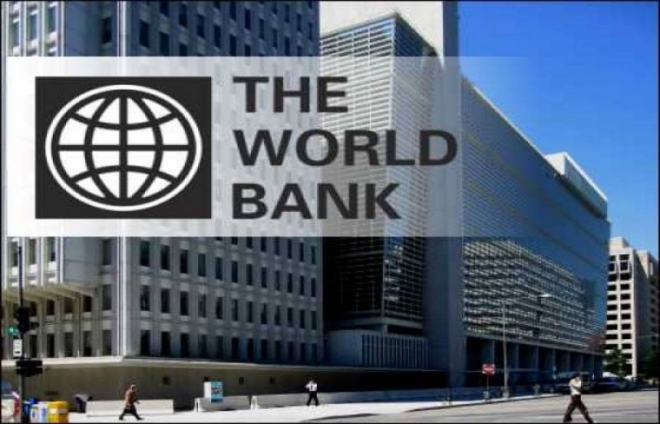China and the World Bank are exploring compromises over how to restructure billions of dollars of debt held by poor nations, seeking a long-sought breakthrough that could unlock desperately needed aid.
Discussions on Wednesday, April 12, 2023, in Washington, during the World Bank and International Monetary Fund’s Spring Meetings, are aimed at ending a deadlock among the world’s biggest creditor nations on how to renegotiate several poorer nations’ debt, which had become unsustainable amid surging inflation and a stronger dollar.
A proposal under discussion this week would see the World Bank provide fresh low-interest loans — known as concessional lending — and other grants to countries on the verge of default, in exchange for China dropping a key demand and agreeing on a timeline for debt relief. The talks were described by people familiar with the matter, who asked not to be identified because the discussions are private and the outcome is still uncertain.
Key to the compromise is the World Bank increasing its emergency assistance to countries in debt distress, something its outgoing president, David Malpass, said on Tuesday that the lender was already intending to do.
Officials from a number of countries cautioned, however, that a major breakthrough is unlikely this week, that China’s position remains unclear and the discussions are focused largely on the overall process.
People’s Bank of China governor Yi Gang is the highest-level official expected from Beijing to attend the talks this week, along with Deputy Governor Xuan Changneng, according to a person familiar with the matter. Finance Minister Liu Kun didn’t travel to Washington, with Beijing opting to send Vice Minister Wang Dongwei instead, said a second person.
The World Bank and US Treasury Department declined to comment, while the PBOC and IMF didn’t immediately respond to requests for comment.
The Wall Street Journal reported earlier on Tuesday on the possible compromise in the talks. Reuters reported late on Tuesday that China would drop its demand on multilateral loans, citing a source it didn’t identify.
The debt-relief efforts, begun by the G20 in late 2020, were intended as a way to coordinate traditional creditor nations, like the US and France, with emerging creditors, particularly China, the biggest lender to emerging economies.
Yet that mechanism, known as the Common Framework, has faced repeated delays over differences about how to treat various forms of debt. Beijing has been pushing for loans from multilateral development banks, such as the World Bank, to be treated the same as other debt — meaning everyone takes a similar “haircut”, or loss, on what’s owed.
That condition has been rejected by the US and others, who argue that such a move would harm multilateral banks’ preferred creditor status, which allows them to borrow and lend cheaply.
Debt distress
More than 70 low-income nations face a collective $326-billion burden. About 15% of low-income countries are already in debt distress and another 45% face high debt vulnerabilities, and the list is growing.
Among the compromises under discussion is a three-month deadline from when the IMF reaches a staff-level agreement with a debtor country for creditors to offer financing assurances, said two of the people. Such assurances are essential for the IMF’s board to sign off on any loans.
If consensus isn’t reached in that time frame, the IMF would be able to invoke its so-called lending into official arrears policy to disburse money. That provision seeks to prevent a creditor from blocking assistance to a cash-strapped country that’s shown commitment to meet loan conditions.
To help the Common Framework process work more smoothly going forward, Malpass said this week that the IMF and World Bank also might provide their joint debt sustainability analysis for debtors with all creditors at the same time, increasing transparency. China had earlier raised questions about the institutions’ analysis, further slowing the efforts to reach a consensus.
A breakthrough in talks this week could open the way for restructurings in nations including Zambia — the first African nation to default on its debt during the pandemic era — and help speed up the deployment of billions of dollars in IMF aid. The African country has been in talks to rework $12.8-billion in loans for more than two years.
Latest Stories
-
Western Region: NDC youth wing embarks on phase 2 of ‘retail campaign’
24 mins -
Action Chapel International holds annual Impact Convention in November
25 mins -
Jana Foundation urges young women to take up leadership roles
30 mins -
All set for Joy FM Prayer Summit for Peace 2024
41 mins -
Managing Prediabetes with the Help of a Dietitian
60 mins -
Joy FM listeners criticise Achiase Commanding Officer’s election comment
1 hour -
Legal Aid Commission employees threaten strike over poor working conditions
1 hour -
Ghana ranked 7th globally as biggest beneficiary of World Bank funding
2 hours -
IMF board to disburse $360m to Ghana in December after third review
2 hours -
Former Bono Regional NPP organiser donates 13 motorbikes to 12 constituencies
2 hours -
Securities industry: Assets under management estimated at GH¢81.7bn in quarter 3, 2024
2 hours -
Gold Fields Ghana Foundation challenges graduates to maximise benefits of community apprenticeship programme
3 hours -
GBC accuses Deputy Information Minister Sylvester Tetteh of demolishing its bungalow illegally
4 hours -
Boost for education as government commissions 80 projects
4 hours -
NAPO commissions library to honour Atta-Mills’ memory
4 hours

